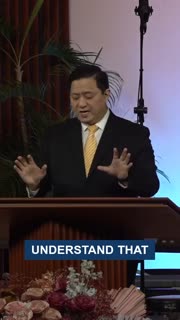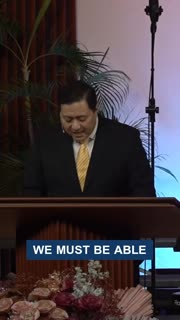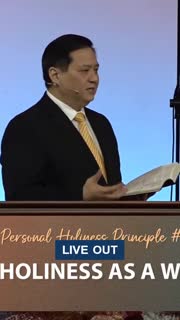Embracing Personal Holiness: A Lifelong Commitment
Devotional
Sermon Summary
Bible Study Guide
Sermon Clips
1. "The problem with a faded flag is the same problem we have as Christians. The world cannot tell the difference between us as a Christian and the life of a non-Christian. We have not self-examined our lives to make sure that the world can see that we're different from the world as followers of Jesus Christ and as children of the Almighty God." [01:50] (24 seconds)
2. "In order to follow the Lord God, well, and faithfully be set apart for His service, we have to prepare ourselves to live holy lives. And this is our first biblical principle for personal holiness. Number one, prepare to live a holy life. Prepare to live a holy life." [04:50] (21 seconds)
3. "If we don't understand that a pursuit of holiness requires sacrifice and preparation, then we will fail in the pursuit of holiness." [08:04] (10 seconds)
4. "We should know God's standards of righteous living and what He expects of holy living. We don't need to guess. He has revealed His divine will for what He expects His followers to do. It would be completely unfair if He didn't tell us and expected us to comply, but He did through the Bible. Therefore, it is on us if we're not the ones who obey." [16:11] (60 seconds)
5. "Thinking that feelings are superior to truth will lead to deadly consequences. Don't guess, my friends. We have to know what is right and what is wrong in God's eyes. And it's clearly spelled out in the Bible." [19:44] (20 seconds)
6. "There should be a high level of respect and honor when it comes to the things of God. Why? Because he is the Lord God. You don't treat God as you would treat your parents and smart off to them. You don't treat God as you would treat your children and give up on them. You don't treat God as you would treat your friends and ignore them." [25:02] (23 seconds)
7. "We must be able to show the world that we live our lives differently or else we will not make an impact in this world for Jesus Christ. They have to see the difference of how Christians act and think, and then through the moving of the Holy Spirit, they will respond." [32:14] (22 seconds)
8. "Live out holiness as a way of life. For example, if you declare that you look up to a business, sports, or cultural hero, and he or she is your idol, what happens? Well, you dress like him or her. You talk like him or her. You execute your style, business style, or cultural style, like his or her style. You basically copy their lives." [34:03] (29 seconds)
9. "We must decide to stop compartmentalizing our lives, where we can be the best Christian on Sundays, but just like the worst of the world, Monday to Saturday. Right? Just like with any diet, you're given one cheat day. But if your cheat days are Monday, Tuesday, Wednesday, Thursday, Friday, Saturday, and you only diet on Sunday, it's not going to work." [37:45] (28 seconds)
10. "People who walk onto the battlefield of life completely unprepared will certainly be defeated over and over again. There has to be intentionality. There has to be preparation on our part towards living a life of personal holiness." [41:22] (20 seconds)
Ask a question about this sermon
2. "In order to follow the Lord God, well, and faithfully be set apart for His service, we have to prepare ourselves to live holy lives. And this is our first biblical principle for personal holiness. Number one, prepare to live a holy life. Prepare to live a holy life." [04:50] (21 seconds)
3. "If we don't understand that a pursuit of holiness requires sacrifice and preparation, then we will fail in the pursuit of holiness." [08:04] (10 seconds)
4. "We should know God's standards of righteous living and what He expects of holy living. We don't need to guess. He has revealed His divine will for what He expects His followers to do. It would be completely unfair if He didn't tell us and expected us to comply, but He did through the Bible. Therefore, it is on us if we're not the ones who obey." [16:11] (60 seconds)
5. "Thinking that feelings are superior to truth will lead to deadly consequences. Don't guess, my friends. We have to know what is right and what is wrong in God's eyes. And it's clearly spelled out in the Bible." [19:44] (20 seconds)
6. "There should be a high level of respect and honor when it comes to the things of God. Why? Because he is the Lord God. You don't treat God as you would treat your parents and smart off to them. You don't treat God as you would treat your children and give up on them. You don't treat God as you would treat your friends and ignore them." [25:02] (23 seconds)
7. "We must be able to show the world that we live our lives differently or else we will not make an impact in this world for Jesus Christ. They have to see the difference of how Christians act and think, and then through the moving of the Holy Spirit, they will respond." [32:14] (22 seconds)
8. "Live out holiness as a way of life. For example, if you declare that you look up to a business, sports, or cultural hero, and he or she is your idol, what happens? Well, you dress like him or her. You talk like him or her. You execute your style, business style, or cultural style, like his or her style. You basically copy their lives." [34:03] (29 seconds)
9. "We must decide to stop compartmentalizing our lives, where we can be the best Christian on Sundays, but just like the worst of the world, Monday to Saturday. Right? Just like with any diet, you're given one cheat day. But if your cheat days are Monday, Tuesday, Wednesday, Thursday, Friday, Saturday, and you only diet on Sunday, it's not going to work." [37:45] (28 seconds)
10. "People who walk onto the battlefield of life completely unprepared will certainly be defeated over and over again. There has to be intentionality. There has to be preparation on our part towards living a life of personal holiness." [41:22] (20 seconds)










